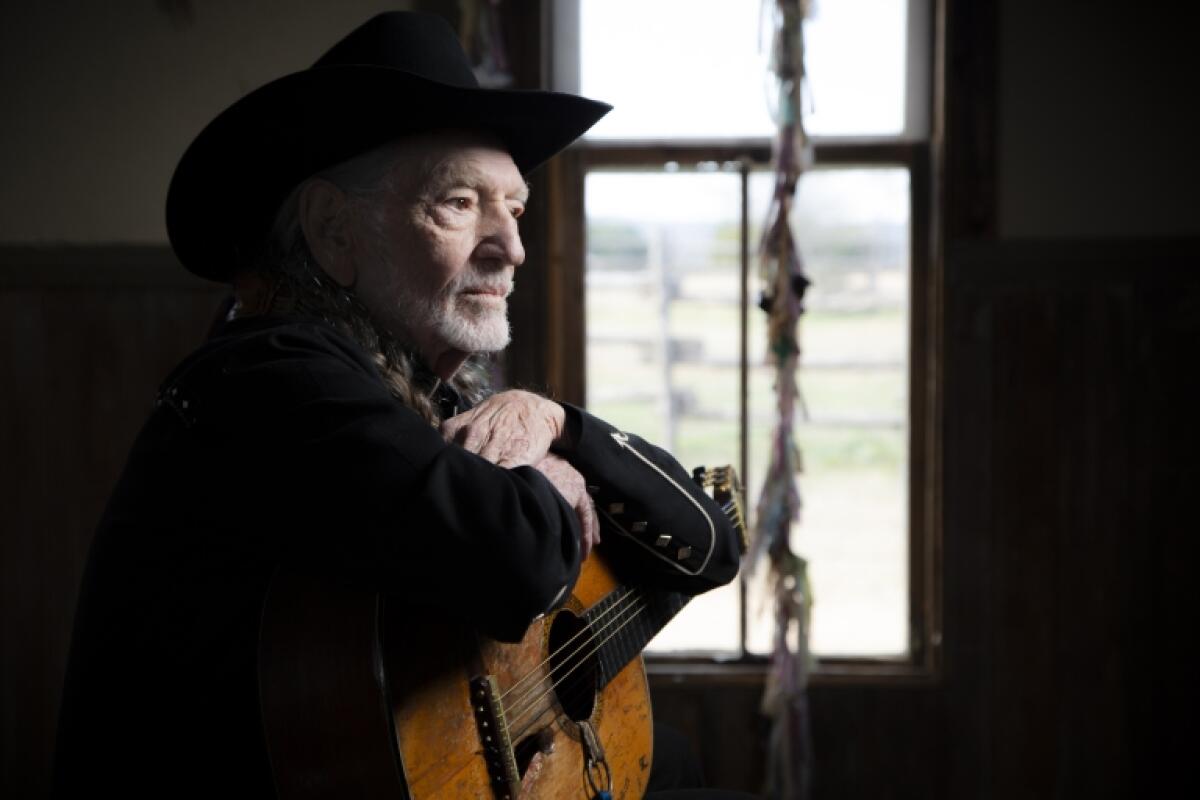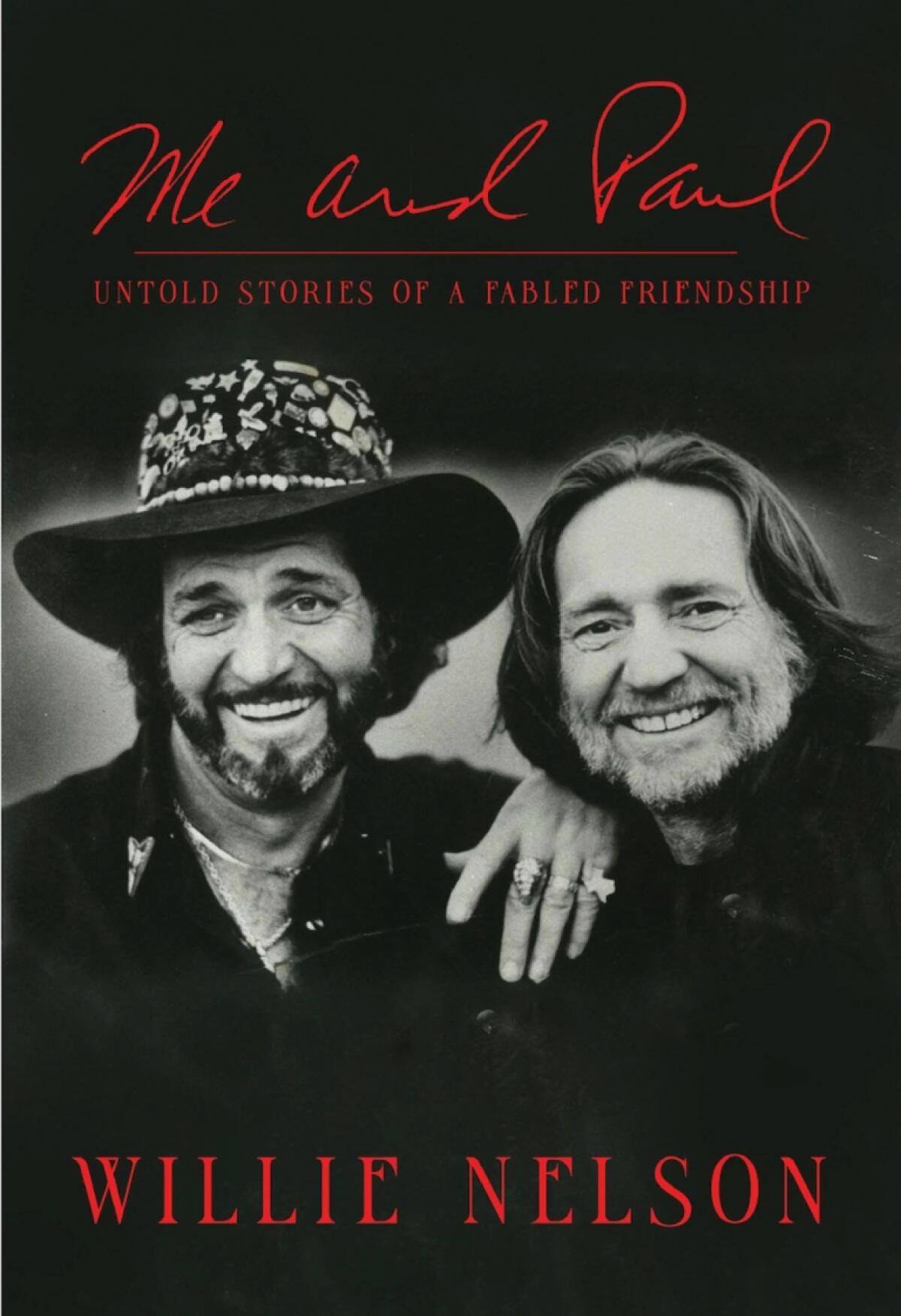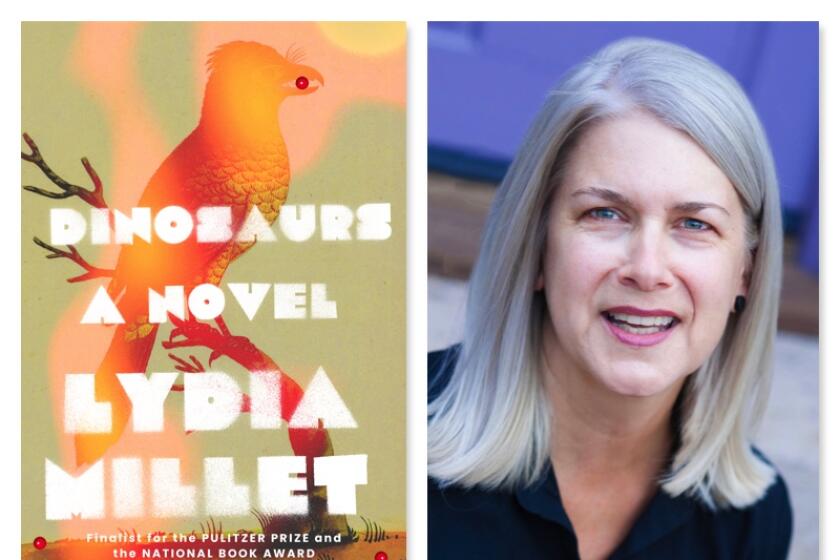5 revelations about Willie Nelson and his new memoir, ‘Me and Paul’

- Share via
On his 89th birthday (April 29), Willie Nelson released his latest album, “A Beautiful Time,” filled with original songs and Leonard Cohen and Beatles classics. Then, he left the studio and hit the road again.
“I’m at the age when I’ve long stopped fussing around and started focusing on the stuff that matters,” Nelson writes in his new book, “Me and Paul.”
As the singer, songwriter, author, actor and activist tours in Southern California, he joined the L.A. Times Book Club Oct. 13 to discuss his book, the story of the 70-year friendship with drummer Paul English that inspired and saved his life. (Watch here.)
In the last three years alone, the 10-time Grammy winner has released four albums and published three books, in addition to lending his name to the popular Willie’s Reserve and Willie’s Remedy brands of cannabis products.

But amid his continuing successes, Nelson also has dealt with the loss of loved ones. In March, his sister Bobbie Nelson, who played piano alongside him for much of their lives, died at age 91. And in 2020, he mourned the death of English, his closest friend and confidant. They met in Fort Worth’s gritty 1950s nightclub scene and stayed together through years of struggle and colorful misadventures and Nelson’s rise to stardom.
Here are five things to know about “Me and Paul.”
It takes the right drummer to bring out the best in a singer. English started out as a trumpet player. But one evening, Nelson didn’t have a drummer for a gig at a Fort Worth club, and he coaxed English into sitting on a wooden crate and accompanying him on an improvised drum kit. Surprisingly, English turned out to be the perfect backup. “Paul was able to follow my spur-of-the-moment musical meanderings,” Nelson writes. “That’s no easy task, but Paul was up to it.” Nelson made him a permanent part of the band and credits his understated style with being the perfect complement to Nelson’s unorthodox vocal style. “A virtuoso drum would have done a lot more, would have put in all sorts of accents and added a whole lot of flare,” Nelson says. “But flare and accents weren’t what I needed. I needed someone willing to go on that journey with me, not too fast, not too slow, pause when I felt like pausing, and then get back on the trail when it was time to move on.”
English helped Nelson bounce back after a suicide attempt. In one of the book’s headline-grabbing revelations, Nelson recalls how he contemplated suicide during a low period of his career in the early 1960s, lying down on a street in Nashville in hopes that he would be run over by a car. Fortunately, there wasn’t any traffic that night, and Nelson staggered back to a bar for another drink. When he awoke in his trailer the next day, English was there beside him, to lift his spirits with a pep talk and a meal at a local rib joint. “I’m keeping track of you, son,” English told him. “You gotta know that by now.” A decade later, Nelson was the one who consoled his friend, after English’s wife, Carlene, took her life. Nelson wrote “I Still Can’t Believe You’re Gone,” as a way of helping English through his grief.

English was Nelson’s bodyguard and debt collector too. “The man saved my life more times than I can remember,” Nelson recalls. In addition to being a skilled musician, English also was an intimidating figure who carried a pistol and was quick with his fists. After a troublemaker threw a bottle at Nelson during a Houston show, English waited until the set was over and then jumped up and punched the man so hard that he broke his own hand and needed surgery to repair it. (“Doesn’t matter,” English told him. “He got it worse than me.”) On another occasion, when a promoter refused to pay Nelson the promised fee for a show, English — who had worked previously as a repo man — hauled away the promoter’s prized Thunderbird and held it for ransom, until he got the money.
Nelson and English crossed paths with Jack Ruby, Lee Harvey Oswald’s killer. In the early 1960s, English introduced Nelson to the infamous Dallas nightclub owner, in hopes that Ruby would book Nelson for a gig. Ruby initially wasn’t impressed with Nelson’s success in Fort Worth, which he said lacked the Vegas-style glamour of Dallas nightlife. A few years later, though, Ruby changed his mind, and floated the idea of opening a huge country music venue with Nelson as the star attraction. Nelson, who by then had moved to Nashville, was about to board a plane to Dallas and meet with Ruby on Nov. 22, 1963, when he learned that President John F. Kennedy had been shot. When Nelson landed in Dallas, English met him and warned him about the deal. “I have a feeling, Willie, we better stay away from Ruby,” English said. “I’m not sure he’s anyone I want to get you mixed up with.” Two days later, the nation watched on TV as Ruby emerged from a crowd of reporters in Dallas and shot Oswald to death.
Lydia Millet, author of ‘A Children’s Bible,’ joins the L.A. Times Book Club to discuss her new novel, ‘Dinosaurs.’
The pair had a longtime acquaintance with Ray Charles. Nelson and English first met the R&B icon when they visited Charles at his home in South Dallas in the early 1960s. They learned that Charles was a country music aficionado who had once been the only black member of a country group called the Florida Playboys. (Charles also challenged Nelson to play chess with him — in the dark, so that Nelson couldn’t see the pieces either.) Charles went on to release a 1962 album, “Modern Sounds in Country and Western Music,” that Nelson recalls as an important influence.
In the book, written with David Ritz, Nelson says he still misses his friend. “I can’t tell you how many times, after hearing the news, I thought to myself: I need to talk to Paul,” he writes. “I need him next to me. I need his advice. I need to feel is presence. I need his love.”
Book Club: If You Go
What: Songwriter Willie Nelson joins the L.A. Times Book Club to discuss “Me and Paul” with Times editor Jaclyn Cosgrove.
When: 5:30 p.m. Pacific Oct. 13.
Where: Watch this virtual event.
Book club newsletter: Sign up for the latest news and events: latimes.com/bookclub
More to Read
Sign up for our Book Club newsletter
Get the latest news, events and more from the Los Angeles Times Book Club, and help us get L.A. reading and talking.
You may occasionally receive promotional content from the Los Angeles Times.











